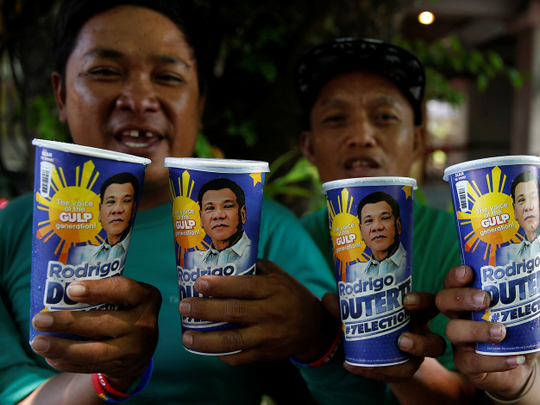
Manila: Philippine presidential candidate Rodrigo Duterte has received a 33 per cent preference rating in the April 26 — 29 Pulse Asia (PA) survey, making him number one in more than five pre-election polls from March to early May, according to Ana Tabunda, executive director of Pulse Asia.
Davao City mayor Duterte’s recent showing is 2 per cent lower than his 35 per cent in the April 16-20 Pulse Asia (PA) survey and 1 per cent lower than his 34 per cent in the April 12-17 PA survey. It is however 1 per cent higher than his 32 per cent in the April 5 — 10 PA survey, 3 per cent higher than his 30 per cent in the March 29 — April 3 PA survey, and 8 per cent higher than his 25 per cent in PA’s Mar 8-12 survey, said Tabunda.
With additional increases, Mar Roxas of the ruling Liberal Party landed second with 22 per cent preference rating in PA’s April 26-29 survey, said Tabunda, adding that Roxas is 11 per cent lower than Duterte.
Roxas preference rating in the April 26-29 survey is 5 per cent higher than his 17 per cent in PA’s April 16 — 20 survey and 4 per cent higher than his 18 per cent in PA’s April 12 — 17 survey. It is also 4 per cent higher than his 18 per cent in PA’s April 5 — 10 survey, 3 per cent higher than his 19 per cent in PA’s March 29 — April 3 survey, and 2 per cent higher than his 20 per cent in PA’s March 8 -12 survey.
Former front-runner and independent candidate, Senator Grace Poe, landed third with 21 per cent preference rating in PA’s April 26-29 survey, said Tabunda, adding that Roxas has overtaken Poe although they remain statistically tied.
Poe’s recent preference rating in the April 26-29 survey is 2 per cent lower than her 23 per cent in PA’s April 16 — 20 survey, 1 per cent higher than her 22 per cent in PA’s April 12-17 survey, 4 per cent lower than her 25 per cent in PA’s April 5-10 PA survey, 4 per cent lower than her 25 per cent in PA’s March 29-April 3 survey, and 5 per cent lower than her 26 per cent in PA’s Mar 8 — 12 survey.
Because of big losses, Vice-President Jejomar Binay, United Nationalist Alliance, ranked fourth from third, after receiving 17 per cent preference rating in PA’s April 26-29 survey, said Tabunda.
Binay’s preference rating in the April 26-29 survey is 1 per cent higher than his 16 per cent in PA’s April 16-20 survey, 2 per cent lower than his 19 per cent in PA’s April 12 to 17 survey, 3 per cent lower than his 20 per cent in PA’s April 5 -10 survey, also 3 per cent lower than his 20 per cent in PA’s March 29-April 3 survey, and 5 per cent lower than his 22 per cent in PA’s Mar 8 -12 survey.
Senator Miriam Santiago, Nationalista Party remained weak throughout. She received 2 per cent preference rating in PA’s April 26-29 survey; similar to her 2 per cent in PA’s April 16 — 20 survey, similar to her 2 per cent in PA’s April 12 — 17 survey, 1 per cent higher than her 1 per cent in PA’s April 5 — 10 survey, and similar to her 2 per cent in PA’s March 29 — April 3 survey, and 1 per cent lower than her 3 per cent in PA’s March 8 — 12 survey.











